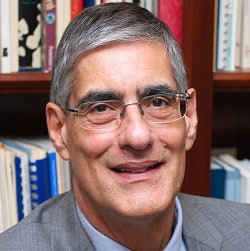The new Consortium for Instructional Excellence and Career Guidance has been formed to provide faculty members innovative teaching practices that effectively serve the career-development needs of students.
A recent study in Sociology of Education indicated that first-generation and low-income college students are less likely to experience and seek support, engage with their professors, find internships and complete their degrees in four years. Additionally, the 2017 Strada-Gallup College Student Survey found that despite the presence of academic and career counseling on virtually every campus, at-risk students may not seek such services.
 Dr. Penny MacCormack
Dr. Penny MacCormackIn response, the Council of Independent Colleges (CIC) and the Association of College and University Educators (ACUE) are partnering to prepare faculty members to use effective teaching practices while also providing career guidance within their courses. The program will reach as many as 500 faculty members from 20 to 25 CIC member institutions.
The program is made possible by a $1.2 million grant from the Strada Education Network, which is focused on completion with a purpose — providing pathways between education and employment.
The process began with CIC member institutions applying to participate. Dr. David Brailow, CIC vice president for development, said institutions will be selected based on several criteria, including level of commitment to the concept of career guidance from faculty.
The program will begin with the fall 2018 semester. ACUE is developing two modules that can apply to various types of courses. Preparing Students with 21st-Century Career-Ready Skills will focus on helping students develop skills such as effective communication and analytic thinking, and Embedding Career Guidance is designed to help faculty members talk to students and incorporate strategies in their courses that connect students with career pathways.
Some of the curriculum will come from existing ACUE evidence-based teaching practices that have been shown to increase student engagement, learning and success. An example would be planning for and facilitating effective class discussions.
“One of the main focuses is to help faculty be more explicit with students about the very skills that they are learning as they engage in an assignment or even a class discussion,” said Dr. Penny MacCormack, ACUE chief academic officer.
Institutions that are selected will then identify the faculty to participate. There will be cohorts of 20-25 faculty members who will take the modules together.
There has been diversity among the applicants, with particular interest from HBCUs and Hispanic-serving institutions, said Brailow.
“All of our coursework includes faculty engaging in the online course as a cohort or as a group because we know that one learns best when you’re able to have rich discussions and thoughtful reflections with your colleagues,” said MacCormack.
CIC is interested in addressing the Strada-Gallup College Student Survey finding that liberal arts majors tend to be less satisfied with their preparation for careers than those who take professionally geared majors.
“We believe in the importance of the liberal arts to any career preparation,” said Brailow. “We want professors in the liberal arts to do a better job, perhaps — if they’re not already — in getting their students ready for careers.”
 Dr. David Brailow
Dr. David BrailowBrailow said many academics had a fairly clear picture of their own career paths from undergraduate to graduate school to work. He hopes this program will allow them to see the dynamic that their students face.
“They need a little bit of help in addressing the concerns that their students have,” said Brailow, a former chief academic officer at a liberal arts college. “My hope is faculty will gain in their confidence and in their ability to talk to students about what they do with an English major, for example. They can give them very specific guidance and show them the steps they can take. Some of this can be embedded in the curriculum.
“This is one reason why we’ve asked institutions when they submit their applications to indicate what faculty population they’re going to address, and why.”
Faculty are often students’ primary contacts. This is particularly true for first-generation and low-income students who have many demands on their time.
“At times, faculty are the key people they engage with on campus,” said MacCormack. “Sometimes, going to class is the only thing they have time to do. We want to make sure that the folks that they engage with most, the faculty, are able to help make those crucial connections between being excited about the literature they’re reading or the science that they’re learning and understand the connection to their lives and future careers. That explicit connection for those students is absolutely necessary and so powerful.
“We see a need for our students to understand the skills that they’re developing in a humanities or a liberal arts course so they can see the applicability to career,” added MacCormack. “That ability to help students see that relevance is something we will really focus on in our course work.”
Brailow said these approaches will not substitute for or override career services. Rather, the project will make faculty better partners for career services and ultimately help students make better use of those services.
“The impact of this project could be quite dramatic,” said Brailow. “Five hundred faculty will be preparing. That translates to thousands of students. I’m hoping we’ll see improved outcomes from students across the board — learning outcomes as well better completion rates, more participation in internships and better job placement for those who graduate within the time of the grant.
“Beyond that, the hope is we’ll come away from this with some best practices and information that will help more broadly improve those outcomes for students.”















